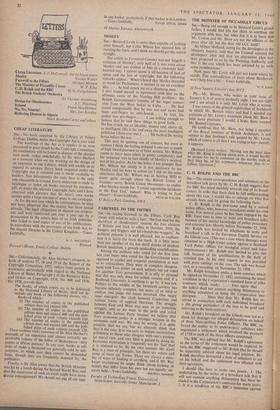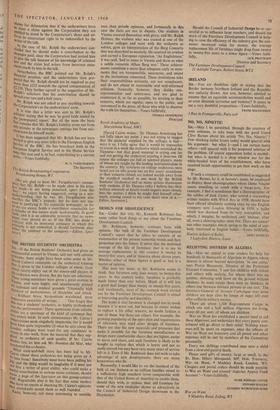SIR,—The recent correspondence and comment on the broadcast talk given
by Mr. C. H. Rolph suggests that the BBC has acted shabbily towards one of its broad- casters. In order that there shall be full understanding about this case, I would like to enlarge on what has already been said by giving the following facts :
C. H. Rolph is the pen-name used by a retired police officer, who, however, broadcasts under his own name. For several years he has been engaged by the BBC from time to time to write and broadcast talks because of his special knowledge of. police procedure and criminal law. Shortly before November 21, 1958, Mr. Rolph was invited by telephone to write and broadcast a talk in the European English Service on the Glinski case. (This was a case where damages were obtained in a High Court action against a Scotland Yard Police Officer for wrongful arrest and false imprisonment.) Mr. Rolph was invited to give this talk because of his qualifications in the field of criminal law. At his own request he was provided with press cuttings on the case. The talk was broad- cast, as a recording, on November 21, 1958.
Mr. Rolph broadcast under a basic contract which he signed on November 11, 1952, containing the usual condition in the Corporation's standard form of talks
contracts which reads : . . You agree that . . . the talk(s) shall not contain anything defamatory or anything calculated to bring the Corporation into disrepute. . . .' Since that date Mr. Rolph has re- ceived in connection with each individual broadcast a slip giving particulars of the fees to be paid and referring to the basic contract.
' Mr. Rolph's broadcast on the Glinski case led to a claim for damages for alleged defamation on behalf of three Metropolitan Police Officers. The BBC re- ferred the matter to its underwriters' solicitors who negotiated a settlement which involved the payment of £750 to each of the three officers concerned.
The BBC was advised that Mr. Rolph's agreement to the terms of the settlement would be required. In turn, the BBC suggested to Mr. Rolph that he should be separately advised about his legal position. Mr. Rolph therefore instructed a firm of solicitors to act on his behalf and the settlement was effected with their agreement.
I should like here to make two points : 1. The undertaking by the writer of a broadcast talk that it will not contain anything defamatory has been in- cluded in the Corporation's contracts for many years. 2. It is a condition of the BBC's insurance against
THE SPECTATOR, JANUARY 15, claims for defamation that if the underwriters have to meet a claim against the Corporation they are entitled to stand in the Corporation's shoes and en- force its contractual right to be indemnified by the writer of the talk.
In the case of Mr. Rolph the underwriters con-
cluded that he should make a contribution to the damages paid, since the Corporation had invited him to give the talk because of his knowledge of criminal law and the claim had arisen from incorrect state- ments made by him in the talk. Nevertheless, the BBC pointed out Mr. Rolph's financial position, and the underwriters then pro- Posed that Mr. Rolph should not be required to pay More than £225 towards the agreed compensation of 4b2,250. They further agreed to the suggestion of Mr. `‘°1Ph's solicitors that his contribution should be spread over two and a half years.
Mr. Rolph was not asked to pay anything towards the Corporation's or the underwriters' costs.
It is true that a letter was sent to Mr. Rolph's solicitor saying that he was 'in good faith misled by fact [newspaper] report.' But all the same the basic la" remains that Mr. Rolph's liability arose not from any mistake in the newspaper cuttings but from mis- statements he himself made. It has been suggested that Mr. Rolph has not been service to give any more talks in the European English Oervice of the BBC. He has broadcast both in the European English Service and in the Home Service since this case and is, in fact, contributing to a current series.—Yours faithfully,
M. G. FARQUHARSON The The Secretary British Broadcasting Corporation,
Broadcasting House, WI [We are glad to have Mr. Farquharson's reassur- ance that Mr. Rolph—as he made clear in his letter .last week—is not being penalised, apart from the
lie': we regret having suggested, owing to a mis-
understanding, that he was. Mr. Farquharson also clarifies the BBC's attitude; but he does not suc- ceed in justifying it. No reputable newspaper, so far as we are aware, holds a contributor responsible for
mistake of this nature made inadvertently, in good
faith; and it is an admirable principle that no news- paper ever should do so. If the BBC has made a contract with its insurance company in which this Principle is not embodied, it should forthwith alter et(iterr] the contract or the company.—Editor. Spec- 11-1E BRITISH STUDENTS' ORCHESTRA



































 Previous page
Previous page